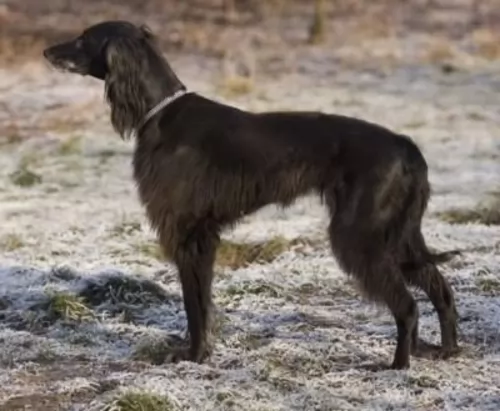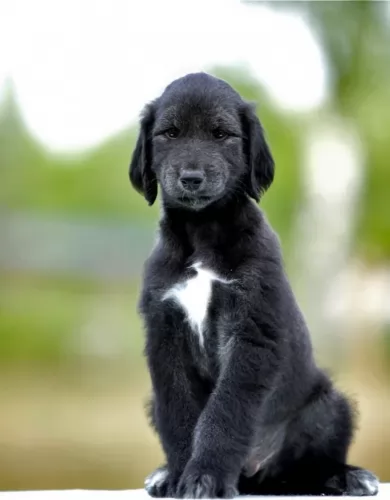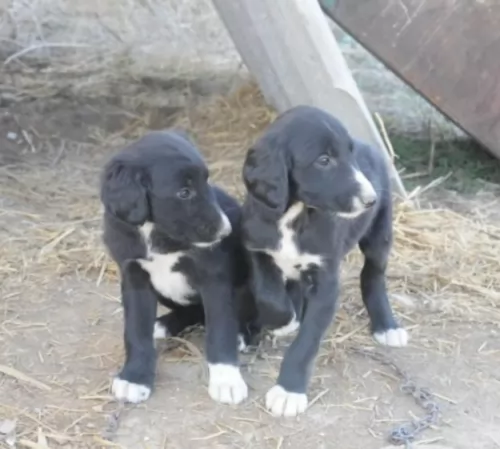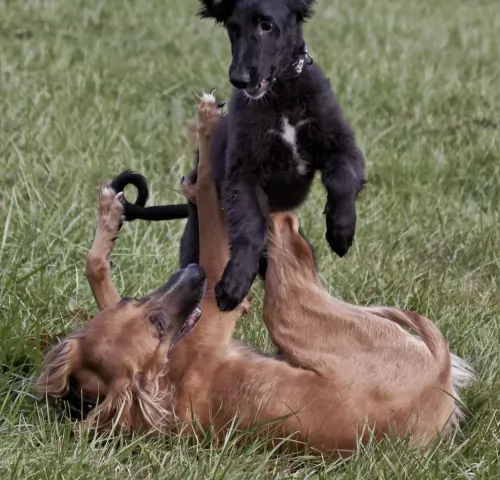 Petzlover
Petzlover Taigan is originated from Kyrgyzstan but Valley Bulldog is originated from Canada. Taigan may grow 37 cm / 15 inches higher than Valley Bulldog. Both Taigan and Valley Bulldog are having almost same weight. Both Taigan and Valley Bulldog has almost same life span. Both Taigan and Valley Bulldog has same litter size. Both Taigan and Valley Bulldog requires Low Maintenance.
Taigan is originated from Kyrgyzstan but Valley Bulldog is originated from Canada. Taigan may grow 37 cm / 15 inches higher than Valley Bulldog. Both Taigan and Valley Bulldog are having almost same weight. Both Taigan and Valley Bulldog has almost same life span. Both Taigan and Valley Bulldog has same litter size. Both Taigan and Valley Bulldog requires Low Maintenance.
 Known also as the Kyrgyzdyn Taighany, the Taigan is a sighthound dog from Kyrgyzstan. Today the dog is recognized by a number of kennel clubs,and more recently by the FCI.
Known also as the Kyrgyzdyn Taighany, the Taigan is a sighthound dog from Kyrgyzstan. Today the dog is recognized by a number of kennel clubs,and more recently by the FCI.
It was after 1991, when Kyrgyzstan became independent, that the role of the dog changed and t became a working dog again.
It was about in 1995 that a new breed standard was adopted, and since 2005 a national kennel club has existed in Kyrgyzstan.
 The Valley Bulldog originates from Nova Scotia, Canada. It is thought that the Boxer, English Bulldog and the Olde English Bulldogge have been used to bring about the Valley Bulldog.
The Valley Bulldog originates from Nova Scotia, Canada. It is thought that the Boxer, English Bulldog and the Olde English Bulldogge have been used to bring about the Valley Bulldog.
 The Taigan is a large dog, looking much like a Grehound. He stands at between 55 and 82cm in height and weighs about 25 - 34kg.
The Taigan is a large dog, looking much like a Grehound. He stands at between 55 and 82cm in height and weighs about 25 - 34kg.
He has that typical slender body and slender head of the greyhound. The coat of the dog is medium length and somewhat curly and can be many colours, sometimes even bi-colored – cream, black and white, brown, grey or yellow.
During the Winter the coat can become long and thick. The ears are floppy and covered with wavy fur. The tail is long and a distinguishing mark of the dog is the way the end of the tail coils up into a ring.
These dogs can’t be kept in small city properties – they are used to wide open spaces.
An intelligent breed, the Taigan will readily learn some basic commands to make him well mannered and obedient. He is strong willed and independent, so it will be beneficial to have him trained.
He also makes a good watchdog. He is an even-tempered dog and he enjoys human companionship although he is somewhat reserved with strangers. Even so, he will still need a strong, firm owner as he is strong-willed and independent and likes to go his own way.
He is able to get along well with children in the home and other pets. Being a fairly large dog, and one that likes to run, he is better suited to large properties in the countryside as opposed to living in the city.
 The Valley Bulldog stands at between 36 and 46cm in height and he weighs in the region of 18 – 36kg. He is actually a taller version of an English Bulldog.
The Valley Bulldog stands at between 36 and 46cm in height and he weighs in the region of 18 – 36kg. He is actually a taller version of an English Bulldog.
He is muscular and sturdy and has the true broad head of which the Bulldog is so familiar. He has small to medium floppy ears and a stump of a tail. He also has the flat muzzle.
The dog’s coat is short and smooth, making him fairly low maintenance, although he is a moderate shedder. It comes in typical Bulldog shades – tan, white, red, black and brindle.
The Valley Bulldog has an excellent nature, being completely non-aggressive, and when he has been trained and socialized you get a superb pet.
He’s intelligent so you won’t have any trouble learning any basic commands. He is able to get along with other pets in the home. He can be quite entertaining too as he becomes clownish, loving to be around his human family. He is also capable of being calm and gentle.
He makes a splendid playmate for children, loving the games as he is quite an energetic dog. He isn’t suited to life in a tiny home in the city because he loves to just run sometimes, and then he can be like a bull in a china shop.
 The Valley Bulldog is guaranteed to make you a splendid pet because he has such a sweet temperament.
The Valley Bulldog is guaranteed to make you a splendid pet because he has such a sweet temperament.
He is such a social, playful dog too. Because of his intelligence, you won't have any trouble teaching him some basic commands. You’ll be amused and entertained by this wonderful dog in your life as his warm personality will ensure you have a true friend in him.
 Any dog, no matter how healthy they may appear to be, can encounter any one of the many common dog illnesses there are. It is highly unlikely that your Taigan will experience these health issues but it’s good to be aware of some of them -
Any dog, no matter how healthy they may appear to be, can encounter any one of the many common dog illnesses there are. It is highly unlikely that your Taigan will experience these health issues but it’s good to be aware of some of them -
Also known as osteosarcoma, bone cancer is more commonly seen in large dogs of any breed. It’s a cancer which spreads rapidly through the body and it is terribly sad that the prognosis for your dog is poor.
You might notice swelling, joint pain and lameness and your dog will appear to always be tired. Sometimes you might see a growth. Your vet might do x-rays and if you catch it early, you can give your pet a longer lease on life.
 It can be sad watching a dog becoming less mobile as joint problems set in. The vet can recommend a diet which can help to manage joint disease. Also, the pain associated with joint problems can be debilitating for your pet and you will want to get your pet to the vet so the pain can be managed.
It can be sad watching a dog becoming less mobile as joint problems set in. The vet can recommend a diet which can help to manage joint disease. Also, the pain associated with joint problems can be debilitating for your pet and you will want to get your pet to the vet so the pain can be managed.
These dogs have quite a few folds around the face and these areas need to be kept clean and dry. An overweight Valley Bulldog should be avoided at all costs as this can put additional weight on the joints.
This is a Brachycephalic breed so they tend to battle with breathing, particularly when they are stressed, agitated or hot. Sometimes these dogs will even gag so as to clear their airway.
Watch for coughing and choking. Such difficulties can be life-threatening for your Valley Bulldog so it is important to recognize respiratory problems with your dog.
 If you feed him one of the commercially manufactured dog foods, make sure its for a large, active dog breed and that it has a good list of ingredients. There are bad packaged dog foods and you want to avoid these. They are devoid of vitamins and minerals.
If you feed him one of the commercially manufactured dog foods, make sure its for a large, active dog breed and that it has a good list of ingredients. There are bad packaged dog foods and you want to avoid these. They are devoid of vitamins and minerals.
Read the packaging to see how much food to give. Also try and give your dog some home-made food too. Make sure it isn’t spicy, exotic foods. Stick to simple, wholesome foods such as boiled chicken, brown rice or pasta, sweet potatoes, spinach and carrots. Chop the food up and mix it into the dry kibble twice a week or so as a treat.
 You need to be careful with a bulldog as they have sensitive stomachs and are prone towards indigestion and flatulence. They will certainly need to avoid some foods and you also want to avoid obesity at all costs. The wrong foods can also cause allergic reactions as well as dermatitis which can be very painful and frustrating.
You need to be careful with a bulldog as they have sensitive stomachs and are prone towards indigestion and flatulence. They will certainly need to avoid some foods and you also want to avoid obesity at all costs. The wrong foods can also cause allergic reactions as well as dermatitis which can be very painful and frustrating.
If you have a Valley Bulldog, for your own peace of mind, speak to your veterinarian or a dog expert about the best foods for a bulldog and also the amount to feed. There are some foods that are totally toxic to bulldogs. Make sure your Valley Bulldog always has a bowl of fresh, cool water available that is easy to reach.
Have grooming sessions with your bulldog where you check inside his ears, inside his mouth for bad teeth and check his eyes and face. His nails will also need to be trimmed.
These dogs are more active than you think but you need to be careful that the exercise isn’t too strenuous. He isn’t the kind of dog that will do well with running next to you as you cycle.
Rather take him on a walk every day and give him some ball games in the garden where you can throw him a ball or allow him to pull on a rope.